What can Salvationists expect at the Mobilize—Newfoundland and Labrador congress?
It’s an opportunity to gather and to celebrate, but more importantly, it’s an opportunity to reflect on what God is calling us to do and be. My message will be that we have to be true to our integrated mission. We are called by God to preach the gospel of Jesus Christ and meet human needs in his name, but sometimes we split that mission, and when we do that, it’s not really The Salvation Army anymore.
There’s an urgent need for us to be a mobilized Army. When we look at the world today, we are not an Army serving in a time of peace; we actually have some huge issues to deal with. Poverty has not yet been defeated around the world, so there’s work for us to do; we need to roll up our sleeves. And we need to be an Army that doesn’t count on its own abilities but is renewed by God’s Spirit and power. That’s what this congress is about. If we don’t come with a desire to be in God’s presence, to be renewed and energized and then sent out, then it will be a good time, but the congress won’t achieve much.
Speaking of mobilizing, you recently launched The Whole World Mobilising campaign. Why is this initiative a priority?
Its roots go back to the Boundless 150 congress in London, England, in 2015. At Boundless, I issued a challenge to the Army to get out there, to be involved in communities and not hide away, and this initiative stems from that. It is about a concern that we might have a feeling of settledness, and there is not the same urgency as our forebears had to go out and preach the gospel. The secret’s in our name—an army only makes sense if it is mobilized. What’s the point of an army that stays in its barracks? Jesus said, “You are to be salt and light,” and it’s only as we go out that we can begin to make a difference.
What’s the point of an army that stays in its barracks?
You have repeatedly emphasized the importance of accountability within the Army. Can you point to some signs that this commitment is taking hold?
Around the world, I see that territories are becoming more serious about this issue. Part of it involves being good stewards because Army funds belong to God and not to us. But also, much of our work has charitable status, and if we are found wanting in the way that we administer funds or run our programs, ultimately we place the mission of The Salvation Army in jeopardy.
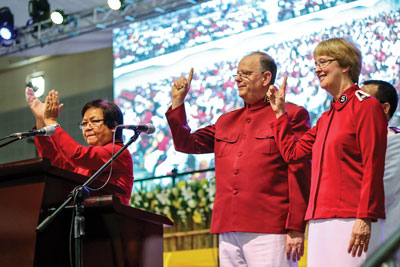 The General and Commissioner Silvia Cox take the salute at centenary celebrations in the India Eastern Tty
The General and Commissioner Silvia Cox take the salute at centenary celebrations in the India Eastern Tty
You have written that, despite globalization, there are more barricades being put up in our world now than at any other time in history. Why do you think the world is so divided, and what can we do about it?
I think we have to recognize the fact that there are many people who feel forgotten or left behind in this globalization movement. We’ve talked for a number of years about the rich getting richer and the poor poorer, and that is a reality in our world today. What concerns me is that we are now making sweeping political changes based on anger and a feeling of disenfranchisement—that is a dangerous route.
I think the other factor is that there is increasing competition for disappearing resources. We use too much of the earth’s renewable resources. If everyone in the world wanted to mirror the lifestyles that we take for granted in much of the western world, we’d need about two and a half worlds, but we’ve only got one. When we talk about making nations great again, I ask, does a nation become great because it has a strong military, or because it has economic clout and concentrated wealth? There has to be a point where we stop amassing and begin to share what we have around the world. What makes a nation great is not its military power or its economic wealth; it’s the way it treats the most vulnerable people in society.
The world becomes stronger, not by building walls, but by building partnerships.… If we join hands, a lot more can be achieved.
Since taking the office of General, you have met with various religious leaders, from imams to the Pope. Why have you made inter-denominational and interfaith dialogue a priority?
The world becomes stronger, not by building walls, but by building partnerships. Large though The Salvation Army is, working in 128 countries, we’re just a drop in the ocean when it comes to responding to the world’s problems, and we need to recognize that. We can’t work in isolation. No organization, government or church is equal to the task. But if we join hands, a lot more can be achieved.
Historically, senior leadership positions in the church, including The Salvation Army, have been occupied predominantly by men. How is the Army working to ensure that there are equal opportunities for men and women officers?
This is an issue that we take seriously at IHQ, and we track it on an annual basis. We look at positions with a reserved or senior reserved appointment status, because those are the ones where I, as the General, can have an influence. The trend we’re seeing is a slow increase in the number of women officers, including married women, who are taking up these appointments. The international management council, which I chair, actually has more women—mainly married women—than men.
 The General meets residents of the Dehiwela Elders’ Home in Sri Lanka
The General meets residents of the Dehiwela Elders’ Home in Sri Lanka
At the international service council, when appointments are discussed, it’s mandatory to ensure that there are suitable opportunities given to both spouses when it’s a married couple. We have changed all the language in the Orders and Regulations so it doesn’t refer to “the chief secretary and wife” but is gender neutral. We’ve recently appointed two assistant chief secretaries here at IHQ, tasked with personnel development, so that will keep this very much on the agenda as we go forward.
Human sexuality is a difficult subject for the church. How is the Army responding to questions about the inclusion of LGBTQ persons?
We are at a very early stage in beginning to wrestle with these issues. We maintain the traditional view on marriage—that marriage is between a man and a woman, it’s a lifelong commitment, and sex is seen to be within the context of that marriage. Of course, that has no bearing on our service to people or our employment of people (see non-discrimination statement). It is as a faith community that we wrestle with these questions, and we’ve got to be very careful in our community not to judge. We need a greater ability to simply listen to people’s experience, to walk in their shoes and understand their realities before we’re swift to condemn. I think our understanding on the whole subject of sexuality is growing. We realize that it’s a very complex topic, and we shouldn’t just weigh in with absolutes, but be willing to listen and dialogue.
As The Salvation Army, we should recognize that LGBTQ people are among the most marginalized, and some of our harsh attitudes are causing harm to individuals. We’re in the process of developing theological tools to help Salvationists reflect and dialogue. There are people who have strong views on both ends of the spectrum, so reconciling those different viewpoints is a huge challenge for us. We have to find answers to questions such as, how can we reflect Christ? If we’re to preach the gospel and meet human needs in his name without discrimination, what happens when people respond? How do we receive people who don’t fit into our lifestyle choices as Salvationists? How can we be a place where people are welcomed and accepted, without compromising our own theological underpinnings? If we are more inclusive, where does that lead us? What is God calling us to do? These are some of the questions that the Army is grappling with. I hope that we are able to have this conversation—a conversation means speaking, but it also means being quiet and listening.
In Canada, the Army is reaching out to Indigenous Peoples to help redress past injustices and build new relationships. How do we promote reconciliation?
We have to begin by acknowledging the wrongs of the past. Reconciliation can only happen if we’re prepared to listen and to recognize the pain and the suffering that injustice has inflicted upon people, and then to work with them to build a better and a brighter future. From my own experience in Africa, these are wounds that may never fully heal. But I’m glad to see that the Army is reaching out. We’ve done it in many places around the world—New Zealand, Africa, Canada—and that’s a positive development, but it’s a long journey. I don’t know that there’s any way you can compensate for the suffering. But recognizing the value that they have as people and the contributions that they make, valuing them in the context of their traditions and respecting them, is an important way forward.
Another hot topic in Canada right now is medical assistance in dying. How do we balance compassion with conviction on this matter?
Our stance is quite clear: We are pro-life in the sense that we believe that we were known by God before we came into the world, that God controls our destiny, and therefore we’re not in favour of assisted suicide. That said, I don’t know anyone who would choose to go this route unless they were absolutely at their wits’ end and in a profound crisis. What do we do with people who make choices that we disagree with? Do we simply turn our back and walk away?
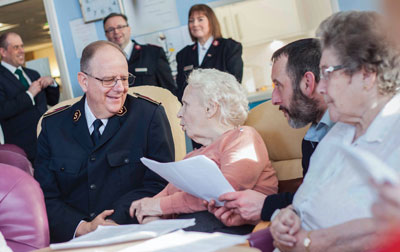 General Cox visits the Army’s Eva Burrows Centre in Scotland
General Cox visits the Army’s Eva Burrows Centre in Scotland
As General, you travel extensively, visiting Salvationists all around the world. Has there been a specific moment or encounter that encapsulates what The Salvation Army is about?
Recently, we were at Poplar Corps in London, England. As a Salvation Army corps that’s 150 years old, it’s had to reinvent itself many times, but in a building whose foundation stone was laid by Catherine Booth. I saw there an expression of the integrated mission of The Salvation Army. In co-operation with other local churches in the East End of London, the corps hall is turned into a night shelter on a regular basis, so that people living on the streets can be kept warm and safe. That epitomizes what The Salvation Army’s about—it’s not just a place where we gather on a Sunday morning.
Another example that comes to mind is in Switzerland, where the Army has one of the largest contracts in providing shelter and accommodation for refugees. While we were there for a congress, all of the shelters were full, and the Army was told another 350 refugees would be arriving the following week and there was nowhere to put them. An appeal went out to corps, asking if they would be willing to temporarily house them while solutions were being found, and about 10 corps put their hands up. To me, that shows an Army that understands its mission.
That mission, of course, is always grounded in the Word. Is there a passage of Scripture that is speaking to your heart these days?
I’ve been reflecting on John 12:24-25, where Jesus tells us that “unless a kernel of wheat falls to the ground and dies, it remains only a single seed. But if it dies, it produces many seeds. Anyone who loves their life will lose it, while anyone who hates their life in this world will keep it for eternal life.” Jesus is reminding us that if we cling to this life, we lose it, yet if we surrender to God’s will, even contrary to what we might expect, we ultimately gain life. The challenge for us as Christians is that it’s one thing to say that we belong to God, that we are disciples of Jesus, but as they say in England, the proof of the pudding’s in the eating—we have to demonstrate that we are.




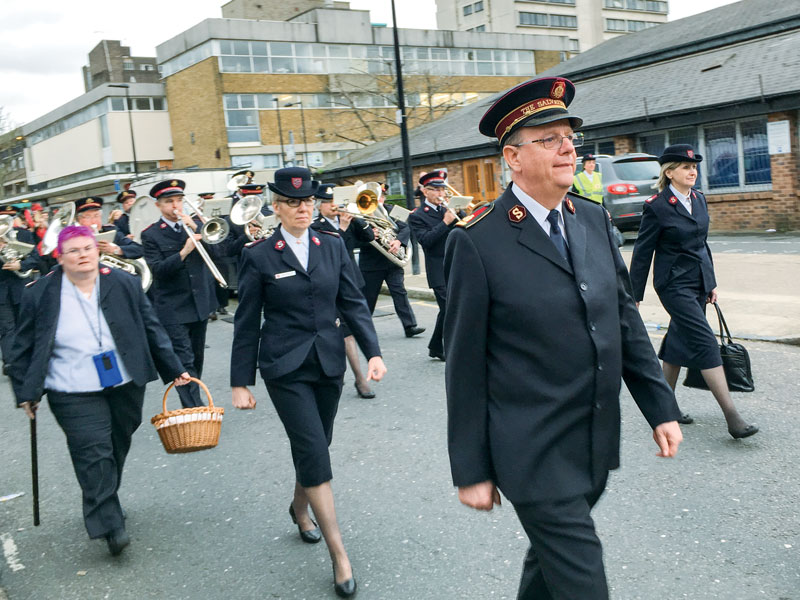
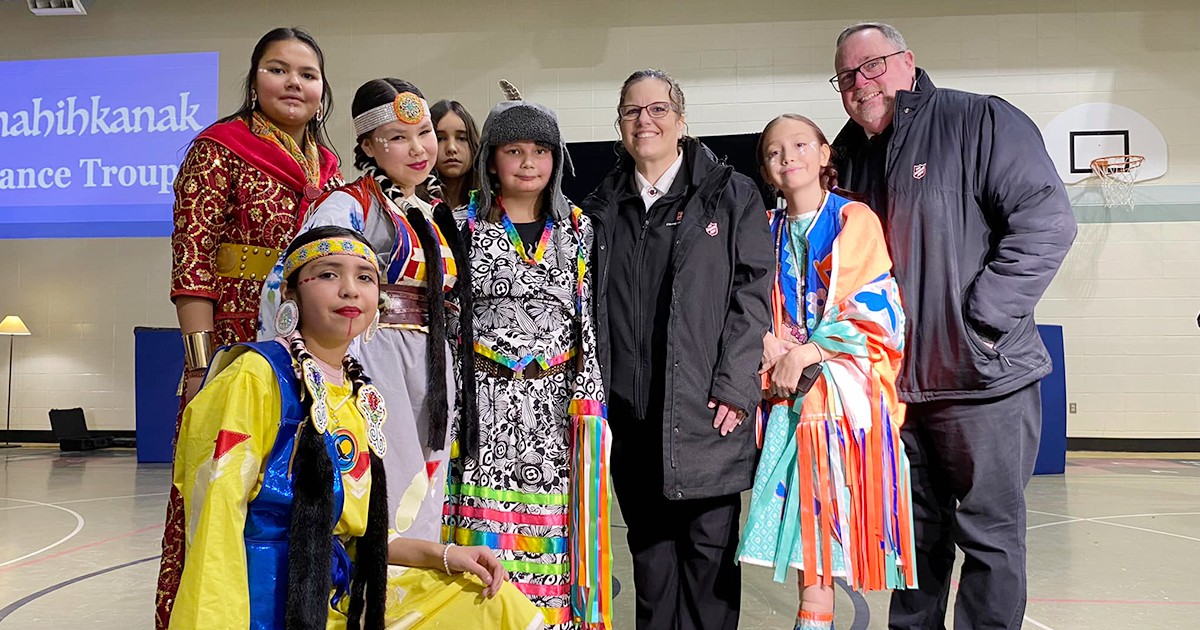
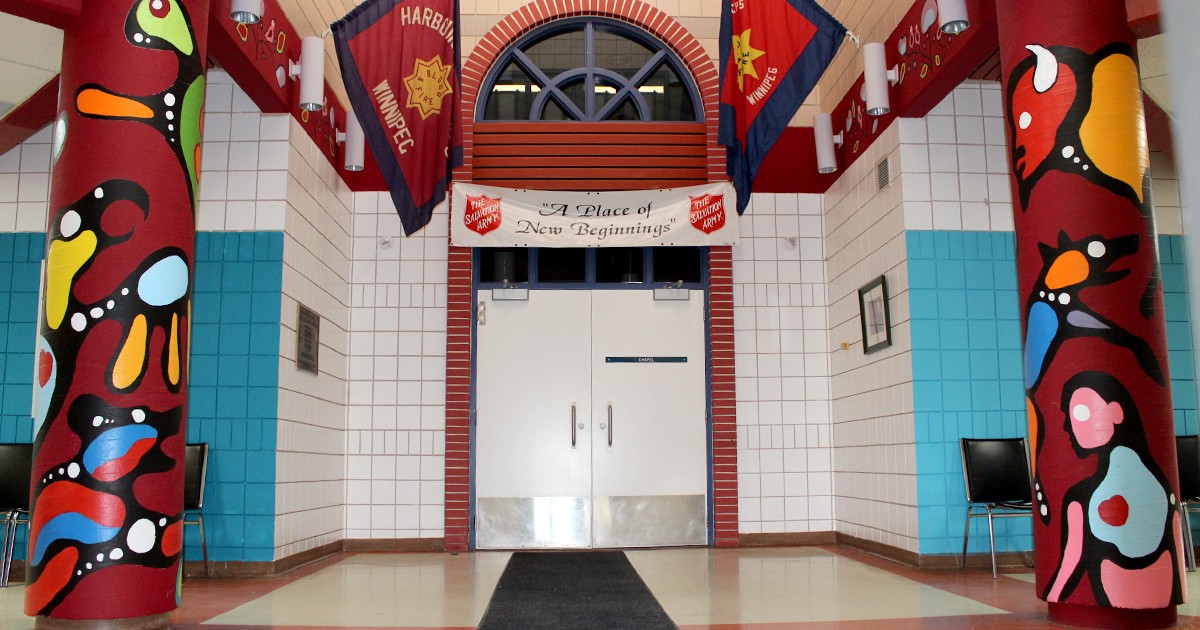
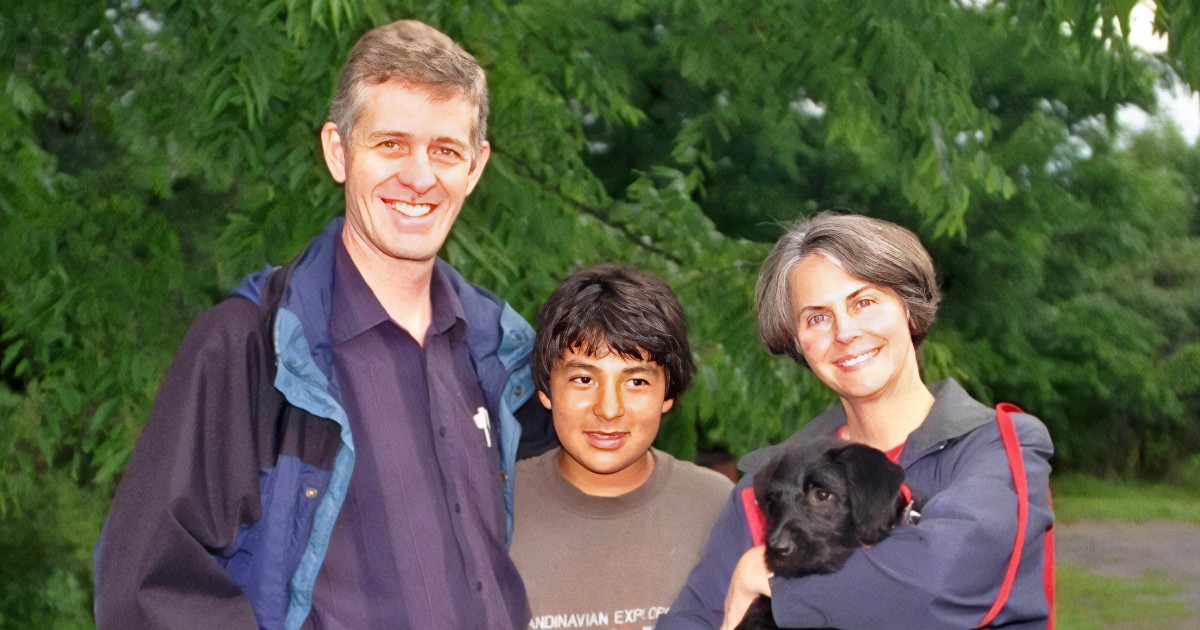


Comment
On Thursday, July 20, 2017, A Rowsell said:
On Saturday, June 24, 2017, Robert Deidrick said:
On Friday, June 23, 2017, Martin Ketteringham said:
On Friday, June 23, 2017, B Thornett said:
Leave a Comment